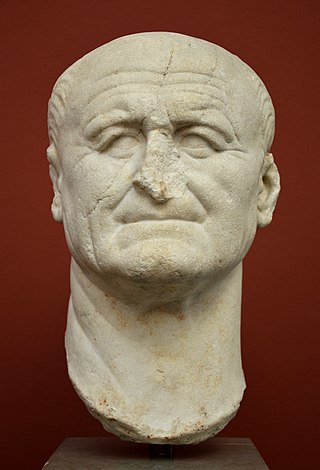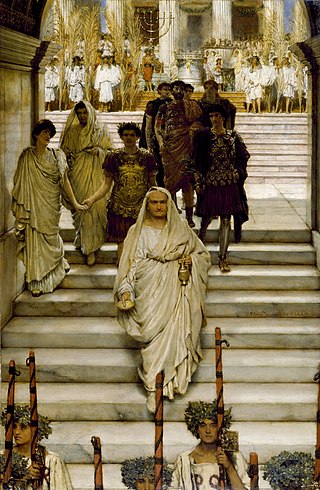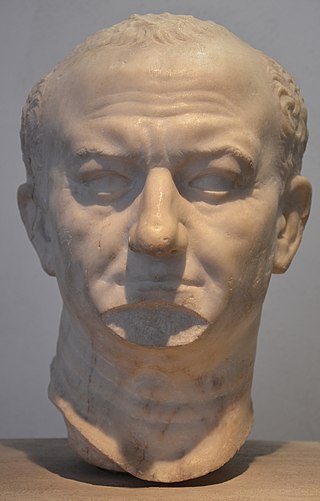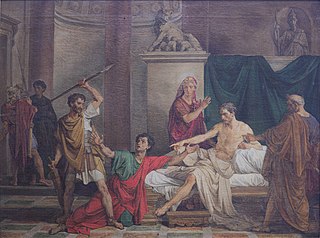Related Research Articles

Gaius Caesar Augustus Germanicus, better known by his nickname Caligula, was Roman emperor from AD 37 until his assassination in AD 41. He was the son of the Roman general Germanicus and Augustus' granddaughter Agrippina the Elder, members of the first ruling family of the Roman Empire. He was born two years before Tiberius was made emperor. Gaius accompanied his father, mother and siblings on campaign in Germania, at little more than four or five years old. He had been named after Gaius Julius Caesar, but his father's soldiers affectionately nicknamed him "Caligula".

Vespasian was Roman emperor from 69 to 79. The last emperor to reign in the Year of the Four Emperors, he founded the Flavian dynasty, which ruled the Empire for 27 years. His fiscal reforms and consolidation of the empire brought political stability and a vast building program.

The 70s was a decade that ran from January 1, AD 70, to December 31, AD 79.

Titus Caesar Vespasianus was Roman emperor from 79 to 81. A member of the Flavian dynasty, Titus succeeded his father Vespasian upon his death, becoming the first Roman emperor ever to succeed his biological father.

Herod Agrippa II, officially named Marcus Julius Agrippa and sometimes shortened to Agrippa, was the last ruler from the Herodian dynasty, reigning over territories outside of Judea as a Roman client. Agrippa II fled Jerusalem in 66, fearing the Jewish uprising, and he supported the Roman side in the First Jewish–Roman War.

The gens Petronia was a plebeian family at ancient Rome. This gens claimed an ancient lineage, as a Petronius Sabinus is mentioned in the time of Lucius Tarquinius Superbus, the last of the Roman kings, but few Petronii are mentioned in the time of the Republic. They are frequently encountered under the Empire, holding numerous consulships, and eventually obtaining the Empire itself during the brief reign of Petronius Maximus in AD 455.

The First Jewish–Roman War, sometimes called the Great Jewish Revolt or the Jewish War, was the first of three major rebellions by the Jews against the Roman Empire fought in the province of Judaea, resulting in the destruction of Jewish towns, the displacement of its people, and the appropriation of land for Roman military use, as well as the destruction of the Jewish Temple and polity.

The Flavian dynasty, lasting from AD 69 to 96, was the second dynastic line of emperors to rule the Roman Empire following the Julio-Claudians, encompassing the reigns of Vespasian and his two sons, Titus and Domitian. The Flavians rose to power during the civil war of AD 69, known as the Year of the Four Emperors; after Galba and Otho died in quick succession, Vitellius became emperor in mid 69. His claim to the throne was quickly challenged by legions stationed in the eastern provinces, who declared their commander Vespasian emperor in his place. The Second Battle of Bedriacum tilted the balance decisively in favor of the Flavian forces, who entered Rome on 20 December, and the following day, the Roman Senate officially declared Vespasian emperor, thus commencing the Flavian dynasty. Although the dynasty proved to be short-lived, several significant historic, economic and military events took place during their reign.
Tiberius Julius Alexander was an equestrian governor and general in the Roman Empire. Born into a wealthy Jewish family of Alexandria but abandoning or neglecting the Jewish religion, he rose to become the 2nd procurator of Judea under Claudius. While Prefect of Egypt (66–69), he employed his legions against the Alexandrian Jews in a brutal response to ethnic violence, and was instrumental in the Emperor Vespasian's rise to power. In 70, he participated in the Siege of Jerusalem as Titus' second-in-command. He became the most powerful Jew of his age, and is ranked as one of the most prominent Jews in military history.

The gens Flavia was a plebeian family at ancient Rome. Its members are first mentioned during the last three centuries of the Republic. The first of the Flavii to achieve prominence was Marcus Flavius, tribune of the plebs in 327 and 323 BC; however, no Flavius attained the consulship until Gaius Flavius Fimbria in 104 BC. The gens became illustrious during the first century AD, when the family of the Flavii Sabini claimed the imperial dignity.

Judaea was a Roman province from 6 to 132 CE, which at its height incorporated the Levantine regions of Judea, Idumea, Samaria, and Galilee, and parts of the costal plain including Philistia, extending over the territories of the Hasmonean and Herodian kingdoms. The name Judaea was derived from the Iron Age Kingdom of Judah, that was centered predominantly in Judea.

Decimus Valerius Asiaticus was a prominent Roman Senator of provincial origin. Asiaticus was twice consul: first in 35 as suffect consul with Aulus Gabinius Secundus as his colleague; second in 46 as ordinary consul with Marcus Junius Silanus as his colleague. He was the first man from Gaul to be admitted into the Roman Senate, as well as the first man from Gaul to attain the consulship.
Marcus Rutilius Lupus was a Roman eques who was active during the reign of emperor Trajan. He was appointed to a series of imperial offices, the most important of which was praefectus or governor of Roman Egypt. It was while he was governor of Egypt that a Jewish uprising known as the Kitos War began. Although Lupus successfully contained the initial revolt in Alexandria, he had to call for reinforcements from the central authorities for assistance, and the revolt was eventually crushed with enormous loss of life and property. Lupus also extended his protection to non-rebellious Jewish residents of Alexandria.

The fiscus Iudaicus or fiscus Judaicus was a tax imposed on Jews in the Roman Empire after the destruction of Jerusalem and its Temple in AD 70.
Alexander Lysimachus the Alabarch was an Alexandrian Jewish aristocrat. His brother was the exegete and philosopher Philo of Alexandria.
The gens Ummidia was a Roman family which flourished during the first and second centuries. The first member of the gens to achieve prominence was Gaius Ummidius Durmius Quadratus, governor of Syria during the reigns of Claudius and Nero. The Ummidii held several consulships in the second century, and through the marriage of Gaius Ummidius Quadratus Annianus Verus they were related to the emperor Marcus Aurelius.
Marcus Lollius Paullinus Decimus Valerius Asiaticus Saturninus was a prominent Roman Senator who was a powerful figure in the second half of the 1st century and first half of the 2nd century. He is also known by the shorter form of his name, Decimus Valerius Asiaticus.
Lucius Julius Ursus was a relative of the Flavian dynasty, who was originally one of the equites who held several imperial appointments, but afterwards was promoted to the Roman senate. He was suffect consul three times: once under Domitian and twice under Trajan.
Lucius Valerius Datus was a Roman eques who flourished during the reign of the emperor Septimius Severus and his sons. He held a series of imperial offices, most notably praefectus or governor of Roman Egypt from 216 to 217.
References
- ↑ Guido Bastianini, "Lista dei prefetti d'Egitto dal 30a al 299p", Zeitschrift für Papyrologie und Epigraphik , 17 (1975), p. 275
- ↑ Brian W. Jones, The Emperor Domitian (London: Routledge, 1992), pp. 40-42
- ↑ CIL III, 31
- ↑ Papyrus Oxyrhynchus , xxxiv.2757
- ↑ Pliny the Elder, Naturalis historia XIX.11
- ↑ Josephus, Bellum Judaicum VII.407-434.
- ↑ Sijpesteijn, "Flavius Josephus and the Praefect of Egypt in 73 A.D.", Historia: Zeitschrift für Alte Geschichte , 28 (1979), p. 119